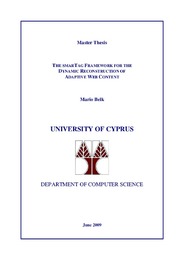| dc.contributor.advisor | Samaras, George | en |
| dc.contributor.author | Belk, Mario | en |
| dc.coverage.spatial | Cyprus | en |
| dc.creator | Belk, Mario | en |
| dc.date.accessioned | 2013-09-16T13:35:59Z | |
| dc.date.available | 2013-09-16T13:35:59Z | |
| dc.date.issued | 2009-06 | |
| dc.identifier.uri | https://gnosis.library.ucy.ac.cy/handle/7/13161 | en |
| dc.description | Thesis (Master) -- University of Cyprus, Faculty of Pure and Applied Sciences, Department of Computer Science, 2009. | en |
| dc.description.abstract | Mass customization should be more than just configuring a specific component (hardware or software), but should be seen as the co-design of an entire system, including services, experiences and human satisfaction at the individual as well as at the community level. The main objective of this thesis is to implement and evaluate a dynamic Web-based framework, called smarTag, for achieving mass customization on the Web based on human factors. SmarTag is an easy to use framework that enables any entity, Web designer and / or developer to enhance their Web services (technology and language independent) with adaptive Web objects that adapt according to the users’ cognitive factors. More specifically, given the users’ individual differences, the same service content provided by an organization will be reconstructed and delivered differently based on the users’ profile typologies. This way, we will increase information assimilation, accuracy on cognitive targets’ searching activities and consequently enhance acceptability of the On-line services. In order to achieve this we extended the well known html model with a new set of tags; <csl> (cognitive style list) and <csli> (cognitive style list item). A Web Browser (Mozilla Firefox) Extension has been therefore developed in order for the browser to recognize and implement the set of tags for the dynamic reconstruction and adaptation of Web content to the individual characteristics of the users.
Therefore, the main objective of this thesis is to describe the smarTag architecture and its components as well as the involved theoretical implications. Towards this point, an overview of Web Personalization techniques and methods is presented and ways on how they can be integrated with Mass Customization of Web services and products are suggested. A high-level analysis of major Web services / sites with regards to the degree of customization based on a given cognitive framework is also outlined, as well as a comprehensive review of current Web Development Frameworks. Finally, an evaluation of the smarTag System concludes the thesis. The initial results of the evaluation have proven that the proposed framework do not degrade the efficiency (in terms of speed and accuracy) during the Web content adaptation process as well as increases users’ satisfaction and efficiency of information processing (both in terms of accuracy and task completion time), while users navigating in the personalized condition rather than the original one. | en |
| dc.format.extent | vi, 98 p. ; 30 cm. | en |
| dc.language.iso | eng | en |
| dc.publisher | Πανεπιστήμιο Κύπρου, Σχολή Θετικών και Εφαρμοσμένων Επιστημών / University of Cyprus, Faculty of Pure and Applied Sciences | |
| dc.rights | info:eu-repo/semantics/openAccess | en |
| dc.source.uri | https://ktree.cs.ucy.ac.cy/action.php?kt_path_info=ktcore.actions.document.view&fDocumentId=12892 | en |
| dc.title | The smartag framework for the dynamic reconstruction of adaptive web content | en |
| dc.type | info:eu-repo/semantics/masterThesis | en |
| dc.contributor.committeemember | Samaras, George | en |
| dc.contributor.committeemember | Pattichis, Constantinos | en |
| dc.contributor.committeemember | Andreou, Andreas | en |
| dc.contributor.department | Τμήμα Πληροφορικής / Department of Computer Science | |
| dc.author.faculty | Σχολή Θετικών και Εφαρμοσμένων Επιστημών / Faculty of Pure and Applied Sciences | |
| dc.author.department | Τμήμα Πληροφορικής / Department of Computer Science | |
| dc.type.uhtype | Master Thesis | en |

